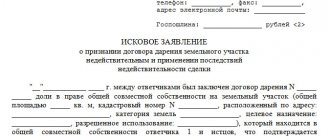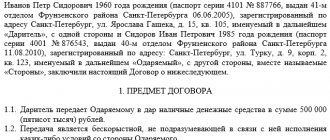- Concept of donation
- Challenging a gift agreement
- How to challenge a gift agreement
- Grounds for challenging a gift agreement
- Is it possible to cancel a deed of gift?
- Who can challenge a gift agreement?
- Can relatives challenge a deed of gift during the life of the donor?
- Time limit for challenging a gift agreement
A gift agreement, like any other transaction, can be challenged in court if there are grounds provided for by the current civil legislation of the Russian Federation.
Donations are often contested by the donors themselves, who for one reason or another have changed their minds about donating the property and want to return it. Also, quite often, after the death of the donor, his relatives want to challenge the gift agreement, believing that the transaction could have been made contrary to the will of the donor.
Many people are concerned about who can challenge the gift agreement, whether it is possible to challenge the gift agreement during the life of the donor, whether it is possible to challenge the deed of gift after the death of the donor, whether the donor’s heirs can challenge the gift agreement, etc.
Concept of donation
What is a gift agreement?
It is legally defined that a gift agreement is a gratuitous transaction in which one party, the donor, gratuitously transfers or undertakes to transfer an item of ownership or property right to the other party, the donee.
As we can see, one of the significant features of the gift agreement is its gratuitous nature , that is, the complete absence of consideration. The presence of any given provision in the form of a thing or obligation indicates the absence of a donation.
What can be the subject of a donation:
- The property of the donor, which means any thing, including movable and immovable property, securities, money, that is, any property that has value.
- A property right (claim) against the donor himself or a third party for any obligation (with the exception of rights inextricably linked with the personality of the creditor, the assignment of which to another person is not permitted, for example, a claim for the payment of alimony)
- Release of the donee from a property obligation to the donor or a third party (for example, forgiveness of a debt).
By concluding a gift transaction, the donor shows the will to alienate property free of charge, and the donee – the will to accept the gift.
The moment of concluding a gift transaction is the moment of transfer of the gift to the donee (Articles 224, 433, 574 of the Civil Code of the Russian Federation).
Donation agreements concluded after 03/01/2013 do not require state registration, but the transfer of ownership of the donated property to the donee is subject to state registration.
Registration of the transfer of ownership of a gift to the donee is not possible without a corresponding application from the donor. Attention: Donation after the death of the donor is unacceptable .
One of the important features of a gift agreement is that it can only be completed during the life of the donor. A promise to make a gift after the death of the donor is void.
Read more about donation here.
Get a free consultation with a gift lawyer. Tel.+7 (812) 989-47-47 Telephone consultation
Challenging a gift agreement
The concept of “challenging a transaction” includes a number of methods of protecting civil rights aimed at terminating or canceling a transaction.
The law clearly defines the grounds for challenging a transaction. If there is at least one of the grounds mentioned in the law, the deed of gift can be challenged.
1) A gift agreement may be challenged on the grounds of its nullity or invalidity by:
- Recognizing a transaction as invalid and applying the consequences of its invalidity
- Application of the consequences of invalidity of a void transaction
2) The gift agreement can be canceled by the donor . Please note that in relation to a gift agreement, we should not talk about termination of the agreement, but rather about the cancellation of the gift in accordance with Art. 578 of the Civil Code of the Russian Federation. Below we will talk about canceling a gift in more detail.
3) The donee may refuse the gift before the donated property is transferred to him.
The possibility of a donee refusing to accept a gift is provided for in Article 573 of the Civil Code of the Russian Federation. According to the provisions of this norm, the donee may refuse the gift before the gift is transferred to him, but at the same time his refusal of the gift must be made in the same form as the donation itself, i.e. If the gift transaction is concluded in writing and certified by a notary, then the refusal of the gift must be made in writing and certified by a notary.
If the donee refuses to accept the gift, the gift agreement is considered terminated.
4) In a number of cases, the donor also has the right by law to refuse to execute the gift agreement (Article 577 of the Civil Code of the Russian Federation).
It is necessary to distinguish between the institutions of invalidity and termination of a transaction.
These are fundamentally different ways of protecting subjective civil rights, since they entail different legal consequences.
An invalid transaction does not entail legal consequences and is invalid from the moment of its completion, that is, it loses force from the moment of its conclusion (retrospectively), and the consequence of applying the invalidity of the transaction is restitution, i.e. the obligation of the parties to return everything received under the transaction.
For declaring a contract invalid, such grounds are provided as non-compliance with laws and other legal acts, the fundamentals of morality and legal order, the conclusion of a transaction with a defect of will, expression of will, etc., while we are talking about violations that could lead to the invalidity of the contract, which took place precisely at the moment conclusion of the contract.
Only a valid transaction can be terminated or canceled, that is, completed in accordance with the requirements of the law, without defects of will, capacity or legal capacity of the donor.
We will help you challenge the gift agreement. Only qualified experienced lawyers work. Tel.+7 Telephone consultation
When can a donation be contested?
In accordance with the current legislation, a transaction involving the transfer of ownership of a real estate property under a deed of gift can be recognized as void within 3 years from the date of state registration of the gift agreement. After 3 years, if circumstances arise that prove the nullity of the transaction under the gift agreement (for example, if the plaintiff did not have information about the existence of the agreement), the court may well declare the transaction illegal. The limitation period for challenging begins from the moment the plaintiff receives information about the concluded gift agreement.
Important! An interested person who is not the Donor has the right to extend the limitation period.
If the Donor wishes to revoke the deed of gift, if there is resistance to this action by the Donee, the period for challenging it is no more than 5 years. The period for challenging a deed of gift by third parties is 1 year from the moment the circumstances arise that are the basis for declaring the transaction invalid. The maximum period for challenging a deed of gift is 10 years.
How to challenge a gift agreement
There are not always compelling legal grounds for challenging a gift transaction; often the desire to challenge the transaction is dictated by a banal refusal to accept the fact of alienation of property, and people try to return it in any way.
Unfortunately, many believe that an incorrect assessment of the situation, rash actions at the time of making a gift transaction and other similar reasons can become the basis for the return of what was transferred under the transaction. Such opinions are wrong. For example, the fact that the donor simply changed his mind about donating his property, or had a quarrel with the donor and broke off relations with him, will in no way affect the result of the transaction; it is impossible to cancel or challenge the donation on such grounds.
It is necessary to have a clear understanding that challenging any transaction is not an easy task. The civil legislation of the Russian Federation defines a clear and comprehensive list of grounds for challenging a transaction. Judicial practice in challenging transactions is not uniform, which makes this category of disputes difficult even for trained lawyers.
The legal complexity of cases in this category is obvious. As a rule, these are assessment cases with individual characteristics that can affect the outcome of the case.
How to challenge a deed of gift and who can challenge a deed of gift can be found out by calling Tel.+7 Telephone consultation
Challenging a gift agreement requires not only excellent knowledge of the current legislation in the field of challenging transactions and law enforcement practice, but also sufficient experience in handling cases of this category.
Therefore, before initiating a challenge to a gift agreement, it is necessary to thoroughly understand the legal intricacies of this issue and understand in what cases it is possible to challenge a gift agreement, whether it is possible to cancel a deed of gift in a particular case, and whether there are legal grounds for challenging a deed of gift.
To do this, it is worth taking advantage of a detailed in-person consultation with a competent lawyer who practices in the field of challenging transactions.
Lawyers specializing in civil law provide free consultations on the possibility of challenging a gift agreement.
For a complete and high-quality consultation, a lawyer needs to deeply study and analyze the available documents, which will allow him to correctly assess the situation.
Only a qualified lawyer with practical experience in handling such cases can help with choosing the appropriate method of protecting a violated civil law and assessing the real prospects of challenging a gift transaction in court.
Who can sue a deed of gift for an apartment?
According to the legislation in force in Russia in 2021, the following have the legal right to challenge a deed of gift for real estate:
- donor;
- close relatives of the party donating housing;
- third parties interested in such a challenge.
Can the donor revoke the deed of gift? Experienced lawyers of the Legal Ambulance website claim that in most of the cases we listed above, this is possible!
Expert opinion
Oleg Ustinov
Practicing lawyer, author of the website “Legal Ambulance”, one of the co-founders of the “Our Future” foundation.
Other interested parties and relatives of the former owner of the living space can also initiate the cancellation of the gift agreement if they have evidence that the donor was incapacitated at the time of registration of the deed of gift.
Also, one of the most frequently asked questions is whether it is possible to challenge a donation agreement for an apartment after the death of the testator or donor? Can. In this case, to challenge the relatives, they should file a corresponding application with the court.
ARTICLE RECOMMENDED FOR YOU:
Promise to grant rights of claim on securities
Grounds for challenging a gift agreement
Let us consider the most common grounds for challenging a gift agreement in law enforcement practice:
- The gift agreement was concluded for a purpose that is deliberately contrary to the fundamentals of law and order or morality.
- The form and procedure for concluding a gift agreement provided for by civil law have not been observed, or the transfer of ownership under the gift agreement has not passed state registration, that is, the agreement does not comply with the requirements of the law and other legal acts
- At the time of the donation transaction, the donor was not able to understand the meaning of his actions and to lead. This basis entails the invalidity of the donation transaction. Such a transaction, unlike a void transaction made by an incompetent person, is voidable. An analysis of law enforcement practice shows that this basis is very common in cases of this category. The evidence base is built on the results of a psychiatric examination conducted in relation to the donor during the period of the deed of gift, as well as on the testimony of the parties, witnesses, assessment of the documents presented by the parties, etc.
- transaction was made for show - the so-called imaginary transaction , when the parties did not intend to create the legal consequences that the donation entails, that is, in fact, there was no intention to transfer the thing. For example, a transaction was made to avoid debts, to avoid foreclosure on property, etc. An imaginary transaction is void, but of course its imaginary nature is subject to proof.
- A donation transaction was made with the aim of covering up another transaction (sale, rent, etc.) - a sham transaction . The sham nature of the transaction is indicated by the intention of the parties to cover up another transaction that actually took place. For example, if the parties draw up and sign a gift agreement in order to cover the actual sale of property, then the gift transaction will be considered void. An example is a gift transaction concluded in order to circumvent the right of a co-owner to preemptively purchase a share in the right of common shared ownership. In this case, the circumstances of compensation for the alienation of property must be proven.
- The transaction was signed by an unauthorized person , signed not by the donor himself, but by another person, made under a forged power of attorney . Often in law enforcement practice there are cases challenging transactions made under a power of attorney, the powers in which are of a general nature, without indicating the subject of the gift and the donee, which is a direct violation of the requirements of the law contained in Part 5 of Art. 576 of the Civil Code of the Russian Federation and entails the nullity of such a power of attorney.
Falsification of signatures on documents can be proven by handwriting examination.
- At the time of the transaction, the donor was deprived of legal capacity by the court due to a mental disorder. This circumstance entails the nullity of the donation transaction. It will not be difficult to prove the nullity of a transaction made by an incompetent person, since the proof is a court decision that has entered into legal force declaring the donor incompetent, and a psychiatric examination of the donor in this case is not required.
- The gift agreement was concluded by the donor under the influence of a significant misconception (regarding the subject, nature of the transaction, etc.), or under the influence of violence or threat, deception, or due to a combination of difficult circumstances (a enslaving transaction).
It should be noted that these grounds for challenging a transaction are the most difficult to prove in court, and without the help of an experienced lawyer it will be difficult to achieve a positive result.
- The gift agreement contains a condition that the property will be transferred to the donee after the death of the donor. This condition also entails the nullity of the gift agreement. A claim for application of the consequences of the invalidity of such a transaction may be brought by the heirs of the donor, since the property “donated” in this way is subject to inclusion in the inheritance estate
- The donation of property was made under existing restrictions or prohibitions on the disposal of property (for example, a pledge of property held by a creditor)
- The notarized consent of the donor's spouse for the donation of property acquired by the donor during the marriage and registered (registered) in his name
Legal advice from lawyers on civil law. Tel.+7 (812) 989-47-47 Telephone consultation
The impossibility of private property being the object of donation
When drawing up a deed of gift for real estate, many nuances should be taken into account. If the object is housing that cannot be donated, then the agreement will not pass state registration. The same rule applies in situations where the donor is a person who does not have the right to receive real estate as a gift, or the agreement is concluded in an improper form.
The deed of gift will be illegal and will not pass the registration procedure with the Federal Registration Service if:
- The object of the contract is housing, the owner of which is a young child (under 14 years of age) or an incapacitated citizen. Guardians, trustees and legal representatives do not have the right to alienate property belonging to these categories of citizens through a gratuitous transaction. Such living space can be sold, but cannot be given away
- The party receiving the gift is a civil servant. Civil servants do not have the right to receive property as a gift for performing their duties.
- Employees of guardianship authorities, hospitals, boarding schools cannot act as the receiving party in a gift agreement if the donor is a citizen undergoing treatment, education or under guardianship in this organization
- The gift agreement is drawn up in simple written form without notarization and its subject is an apartment that is in shared ownership. It does not matter whether one share or the entire apartment is donated; such transactions must be certified by a notary starting from 2021. This rule does not apply to donating a share in an apartment owned by one owner
Deeds of gift drawn up with the above violations do not need to be challenged in court, since they will not be registered with Rosreestr.
Is it possible to cancel a deed of gift?
The possibility of canceling a donation is provided for by law (Article 578 of the Civil Code of the Russian Federation). This provision specifies the grounds upon which the donor has the right to cancel the donation and return his property.
1) The donor has the right to cancel the donation in the following cases:
- The donee has made an attempt on the life or health of the donor or his close relatives
- The donee caused bodily harm to the donor
2) In case of deliberate murder of the donor by the donee , the heirs of the donor can cancel the donation.
3) Cancellation of a donation is entailed by the recipient’s careless handling of the thing donated to him, which has great intangible value for the donor. The law states that the donor can legally demand the cancellation of the gift if the recipient’s handling of the thing donated to him, which has great non-property significance for the donor, entails the risk of imminent irretrievable loss of this thing.
4) The donor survived the donee. The gift agreement may provide for the possibility of cancellation of the donation by the donor if he outlives the donee (Part 4 of Article 578 of the Civil Code of the Russian Federation). The inclusion of such a condition in the contract is the will of the donor, but its mere presence in the contract does not entail the automatic cancellation of the gift in the event of the death of the donee before the donor.
To cancel the donation, the donor will have to file a lawsuit against the heirs of the donee, justifying his claim with the relevant term of the contract. Of course, the opportunity to cancel the deed of gift in accordance with Part 4 of Art. 578 of the Civil Code of the Russian Federation should be used when concluding a gift agreement; the inclusion of such a clause in the gift agreement will not be superfluous.
The parties may terminate the donation agreement (cancel the donation) by written agreement without judicial intervention , however, if the donee evades the conclusion of such an agreement if there are appropriate grounds, the donation can only be canceled by judicial procedure.
If the donation is cancelled, the donee is obliged to return the donated property to the donor, provided that it has been preserved by that time.
What to do after the court has declared the deed of gift invalid
The applicant must receive a court decision that has entered into legal force. When the plaintiff’s demands to recognize the deed of gift as invalid have been satisfied, the defendant will be required to return the item received as a gift.
If the subject of the gift agreement was real estate, the plaintiff must re-register ownership through the MFC or Rosreestr. For this you will need the following documents:
- A judicial act that has entered into force.
- Passport.
- Receipt for payment of state duty - 2 thousand rubles. for individuals and 22 thousand rubles. for legal entities.
In cases where the donee prevents the execution of a court decision (does not return the item received, refuses to hand over documents for the property), the applicant has the right to apply to the FSSP for forced execution of the judicial act.
To do this, you need to obtain a writ of execution by writing a corresponding application to the court that made the decision on the case. In the application, you can immediately request that a writ of execution be sent directly to the FSSP.
Can relatives challenge a deed of gift during the life of the donor?
If the donor is not deprived of legal capacity or limited in it, the transaction was made in accordance with the requirements of the law and other legal acts, the donor was of sound mind and sober memory when making the transaction, the relatives of the donor do not have the right to challenge the agreement during his lifetime.
The owner disposes of his property at his own discretion, that is, he has the right to alienate it in any way, to any person and at any time.
The donor is not required to ask anyone's consent to dispose of his property, with certain exceptions. For example, when we are talking about property acquired during marriage, the donation of such property requires the notarized consent of the donor’s spouse, or when property is alienated by donation by a person limited in legal capacity due to alcohol or drug abuse, the mandatory consent of his trustee is required.
How to Avoid Contestation
You can eliminate the possibility of challenging a gift transaction at the stage of its registration. The deed of gift must be drawn up in accordance with all the rules of the law in force for a particular situation. To take into account all possible deviations from the regulations and avoid them, it is necessary to consult with a competent lawyer.
Timely re-registration of property rights in accordance with the provisions of the agreement helps to avoid filing a claim for the invalidity of a gift. In this case, the property alienated in favor of the recipient will not be included in the inheritance mass after the death of the donor. This means that the heirs will not be able to claim their rights to it.
The sane state of the donor, documented and in the presence of third parties (for example, a notary), may serve as a reason for refusing to refute the deed of gift. It is also possible to obtain written consent from close relatives of the donor.








